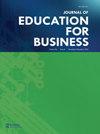商科学生的横向和纵向网络行为对其学习和表现的影响
IF 0.7
Q2 EDUCATION & EDUCATIONAL RESEARCH
引用次数: 0
摘要
本研究借鉴网络行为学的相关文献,探讨了商科学生在课外与同学一起学习的社会网络行为(即横向网络行为),以及与他人一起学习的社会网络行为(即纵向网络行为)。本文章由计算机程序翻译,如有差异,请以英文原文为准。
The influence of business students’ horizontal and vertical network behavior on their learning and performance
Drawing on network behavior literature, this research examines how business students’ extra-classroom social network behavior for learning with peers (i.e., horizontal network behavior) and with th...
求助全文
通过发布文献求助,成功后即可免费获取论文全文。
去求助
来源期刊

Journal of Education for Business
EDUCATION & EDUCATIONAL RESEARCH-
CiteScore
3.10
自引率
8.30%
发文量
32
期刊介绍:
The Journal of Education for Business is for those educating tomorrow''s businesspeople. The journal primarily features basic and applied research-based articles in entrepreneurship, accounting, communications, economics, finance, information systems, management, marketing, and other business disciplines. Along with the focus on reporting research within traditional business subjects, an additional expanded area of interest is publishing articles within the discipline of entrepreneurship. Articles report successful innovations in teaching and curriculum development at the college and postgraduate levels. Authors address changes in today''s business world and in the business professions that are fundamentally influencing the competencies that business graduates need. JEB also offers a forum for new theories and for analyses of controversial issues. Articles in the Journal fall into the following categories: Original and Applied Research; Editorial/Professional Perspectives; and Innovative Instructional Classroom Projects/Best Practices. Articles are selected on a blind peer-reviewed basis. Original and Applied Research - Articles published feature the results of formal research where findings have universal impact. Editorial/Professional Perspective - Articles published feature the viewpoint of primarily the author regarding important issues affecting education for business. Innovative Instructional Classroom Projects/Best Practices - Articles published feature the results of instructional experiments basically derived from a classroom project conducted at one institution by one or several faculty.
 求助内容:
求助内容: 应助结果提醒方式:
应助结果提醒方式:


